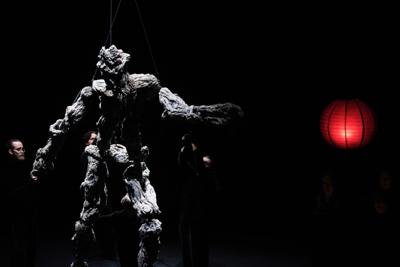This year marks Chicago Opera Theater’s 50th anniversary. One of the most surprising elements of the company’s celebration of this landmark year is that they are only producing one opera, with the rest of the season filled out with several opera-adjacent events such as recitals of complex song cycles or a concert performance of a new opera.
Last month COT delivered its only opera of the season, and it was a doozy. Conductor Lidiya Yankovskaya and director Francesca Zambello combined forces for a magnificent production of Shostakovich’s satirical opera “The Nose”. I will remember this as one of Yankovskaya’s greatest moments as music director of COT, and it is the last opera she will conduct in that job as she leaves the organization at the end of this season.
“The Nose” is followed on the COT schedule by three performances this past weekend at the Studebaker Theater of a well-hyped performance piece entitled “Book of Mountains and Seas” with libretto and score by Huang Ruo. It amounts to 10 minutes of mildly interesting music and puppetry stretched into an 80-minute snooze-fest. This is the sort of music that is more boring than watching asphalt harden, no matter how happy you are to see the pothole go.
“Book of Mountains and Seas,” I believe, could be placed in the puppet tease genre. Like its analogue the strip tease, the puppet tease is characterized by very little puppet and a considerable measure of tease. The puppet is hinted at from time to time throughout this mostly eventless work, but only appears briefly near the very end, when you see him assembled into a giant, offer a gangling lope of a few steps across the stage, and then you witness the disassembly.
There is very little which is communicated to the audience. The libretto, as it is called, is very short and often includes cryptic statements. We are told that the singers are performing in Chinese as well as a made up language. It would have been interesting to know what texts Huang Ruo found required a made-up language, but there was no way of knowing, and thus no way of evaluating the success of the made-up bits.
You are left with an uncomfortable feeling that this is really a cousin to a carnival act encased in some pretentious, repetitive sound. The fact that the entire event takes place in the dark emphasizes the idea that it’s only interesting precisely because it’s dark. That’s not going to keep you going for an hour and 20 minutes.
The singers of Ars Nova Copenhagen were splendid, while percussionists Michael Murphy and John Ostrowski communicated their music with zest and musicality. None of these performers can be blamed for the oftentimes hollow and weak nature of the musical setting and the strung out storytelling.
For information on upcoming COT events, visit ChicagoOperaTheater.org



(0) comments
Welcome to the discussion.
Log In
Keep it Clean. Please avoid obscene, vulgar, lewd, racist or sexually-oriented language.
PLEASE TURN OFF YOUR CAPS LOCK.
Don't Threaten. Threats of harming another person will not be tolerated.
Be Truthful. Don't knowingly lie about anyone or anything.
Be Nice. No racism, sexism or any sort of -ism that is degrading to another person.
Be Proactive. Use the 'Report' link on each comment to let us know of abusive posts.
Share with Us. We'd love to hear eyewitness accounts, the history behind an article.